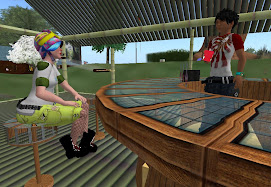I have always considered the LMS (e.g.Blackboard) have established a structure for online courses that everybody has to follow because institutions have invested in this system, money is involved....courses are boring for me as a learner because everything is predictable all courses are the same, there is no creativity and innovation. But they are into the "sales business " I don't think they are so interested in"learning". So far I have refused to use Blackboard and all the experiences I have done, I used open source and free access resources, because I feel free to be creative and organize things in different ways. So when Stephen started his presentation by saying that he has a different picture of e- learning : "it's not just about learning, or about returning investment, competences , testing but to be our own governors...."Oh! I thought... this is going to be exciting and challenging.
So on this quite long post I will post some of his ideas and comments from his audio and slides:
http://www.downes.ca/presentation/32.
Traditional Learning
The lecture
Content based(libraries)
Learning happens when contents is inside learner's head
Controlled, step by step, the room , the board, the teacher.
Static
Networked learning
The Dialogue
Resource based
Learning happens when a conversation is taking place
Personalized, free, public, open
Dynamic
entity (person, resource, anything) that sends or receives a message or signal, and connections or links between entities.
Some properties of networks:
density: how many other entities, each entity is connected to.
speed: how quickly a message moves to an entity.
flow: how much information an entity process: includes messages sent, received and transfers.
plasticity: how often connections are created/ abandoned.
Networks design principles
- DECENTRALIZE: "the more decentralized, the more stable" You don't put everything in only one room
- DISTRIBUTE.(SEPARATION) Entities resides in different physical locations." The content is relevant until you put it in a context".
- DISINTERMEDIATE: "mediation is a barrier between source and receiver" people can communicate directly.( No teacher between knowledge and student, editor/reviewers prior publication, and so on) "When the message is in the network it has no meaning. It only acquires meaning when it is received". If you control the messges, you work on incomplete meaning.
- DISAGGREGATE: (break down). "Bundles: prepackaged courses". Work with discreet elements.learning objects.The network allows and fosters "the capacity of people to organize materials in their own way: we locate, discover and make the organization according to our own needs". By the way, this is what I'm doing in CCK08.
- DIS-INTEGRATE: (Have a common language, it's not disintegrate or destroy) No need for plugs, or software programs. The code is open, not proprietary as it is now. "Microsoft is an integrated environment, all pieces have to fit exactly).Standards are not created, they evolve. Standards adopted by agreement, not requirement.
- DEMOCRATIZE: entities are autonomous, diversity is an asset, control is imposible. Autonomy is the core of the network. I love the following quote "Imagine an environment where students can decide which professor they want in the world, what to read, which students the will interact with..."
- DYNAMIZE: a network is fluid,changes constantly. It is through the process of change that new knowledge is discovered. Creation of connections is a core function.
- DESEGREGATE: Learning happens anywhere. Learning is a part of living, of work, of play. Learning is not a separate domain. The network is everywhere so the posibilities of learning are not restricted to the idea of "school"= place we go to learn".
The meaning = the learning is not located in one place. it is distributed across the network. One person knowledge is also distributed. "Learning is about how to build a society, it is not a bunch of facts or things in the head: learning is how to communicate, how to interact, to form and manage connections, how we place ourselves in the world".



No hay comentarios:
Publicar un comentario